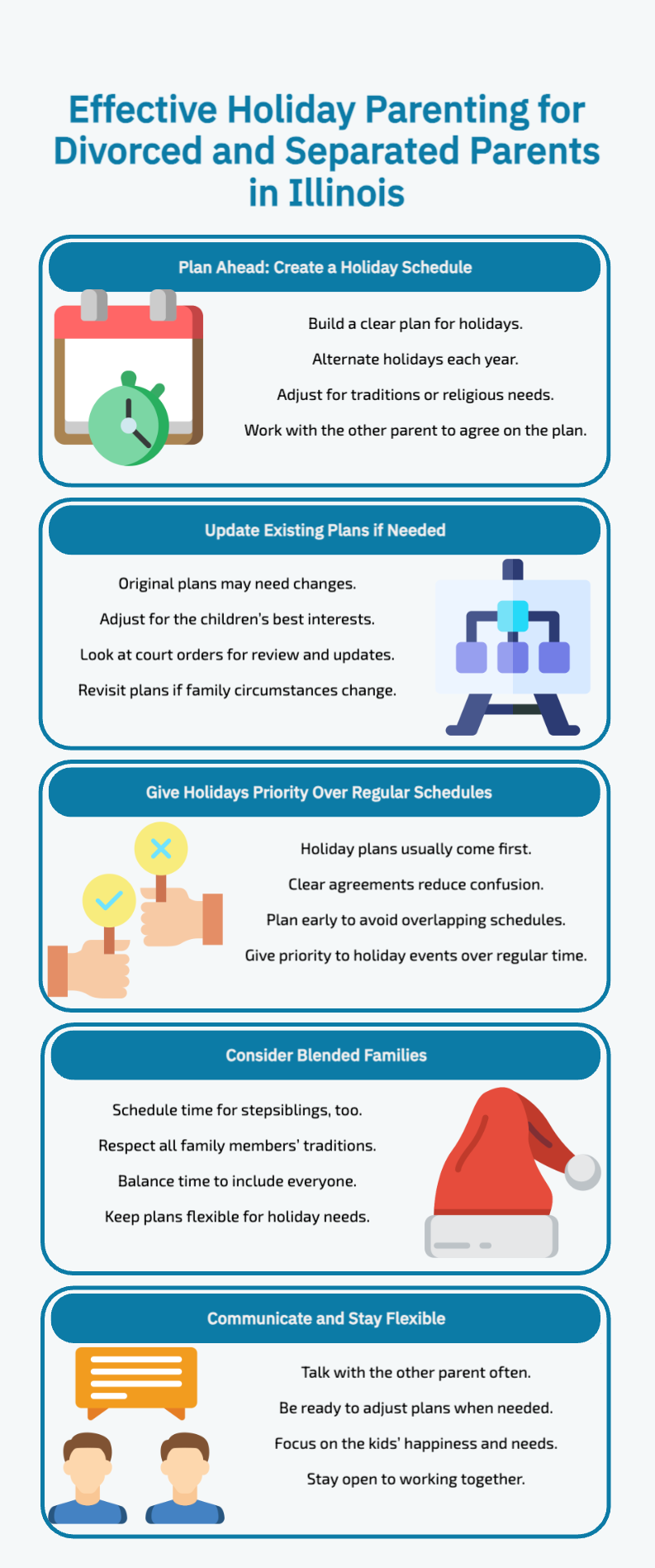Divorced parents face many challenges during the holidays. Planning can be difficult, especially when it’s unclear where the children will be for specific holidays. Even a temporary order with a holiday parenting schedule helps provide certainty.
Holidays are already challenging in a family with separate households, and uncertainty only adds stress for the children. Cooperation and planning are key to ensuring the children’s happiness during this time.
How to Create a Holiday Parenting Schedule That Works
When there are no restrictions on parenting time, courts usually alternate holidays between parents on an even-year/odd-year basis. But if the parents celebrate different holidays, the court might adjust this.
For example, if they follow different religions, one parent could have all their religious holidays every year, instead of alternating. The court also looks at family traditions. If one parent’s family always hosts a Christmas Eve party while the other celebrates on Christmas Day, alternating wouldn’t make sense.
In this case, one parent would have Christmas Eve every year, and the other would have Christmas Day. Most parents can agree on a holiday schedule, even if they can’t agree on regular parenting time, since alternating holidays is usually simple.
If you like to listen to a podcast of this article, feel free to listen here
Legal Foundations of Holiday Parenting Time in Illinois
Under Illinois law, holiday parenting time is typically considered a priority over regular parenting schedules. According to the Illinois Marriage and Dissolution of Marriage Act (750 ILCS 5/602.7), parenting plans must address holidays, school breaks, and special occasions in detail. Courts usually expect parents to define these times clearly to avoid disputes. If not specified, courts may follow general customs, such as alternating holidays annually.
Make-up parenting time is also a legal option in Illinois. If a parent misses scheduled time due to the other parent’s actions or unexpected events, the law (750 ILCS 5/607.5(c)(5)) allows courts to award compensatory time, ensuring children maintain strong relationships with both parents.
What to Do When Your Holiday Parenting Plan Is not Working
Some parents may create a holiday schedule but later realize it isn’t working well. When this happens, and there is a substantial change in circumstances, the schedule can be modified if it’s in the children’s best interests.
Many Allocation Judgments also include provisions that require or allow for regular reviews—annually or otherwise—to assess any necessary changes as the children grow older. These provisions also allow the holiday schedule to be revisited.
The Allocation Judgment will outline the first steps in modifying the schedule. In some cases, parents may need to attend mediation before filing a motion to modify parenting time, including holiday parenting time. The co-parents must follow the Allocation Judgment unless there are urgent circumstances.
If you and your co-parent cannot agree on a holiday schedule but have met all the requirements of your Allocation Judgment, you can file a motion to request a change to parenting time or schedule. The court will hold a hearing, typically considering the status quo and why modifying the schedule would benefit the children (rather than the parents).
Holiday schedule changes are usually straightforward. However, if the situation is particularly hostile or there are other complicating factors, the court may appoint or reappoint a Guardian Ad Litem or Child Representative to assist.
Case Examples: Real Outcomes in Holiday Parenting Disputes
Our firm has helped countless families navigate holiday parenting challenges. Here are examples of how Illinois courts have resolved similar situations:
Case Example 1: Religious Holiday Accommodation
A divorced couple disagreed about their holiday schedule. The mother practiced Judaism and wanted all Jewish holidays, while the father celebrated Christmas and Easter. Their original agreement alternated all holidays on an even-year/odd-year basis, which meant each parent missed important religious observances.
We helped them modify their parenting plan to reflect their religious practices. The court approved an arrangement where the mother received all Jewish holidays every year (Rosh Hashanah, Yom Kippur, Hanukkah, Passover), and the father received all Christian holidays every year (Christmas Eve, Christmas Day, Easter). This solution allowed the children to participate meaningfully in both religious traditions without either parent sacrificing important observances.
Case Example 2: Extended Family Tradition Protection
A father filed a motion to modify the holiday schedule after his parenting plan gave him odd-year Christmas Day but his family’s traditional Christmas gathering always occurred on Christmas Eve. For three generations, his extended family had gathered at his parents’ home on Christmas Eve, and his children were missing this important family connection.
The court recognized the value of maintaining extended family relationships and modified the order. The father now has Christmas Eve every year, while the mother has Christmas Day every year. Both parents were satisfied because each had uninterrupted time with the children, and the children maintained important family traditions on both sides.
Case Example 3: Make-Up Time After Violation
A mother consistently refused to return the children after her holiday parenting time, often keeping them an extra day or two. This pattern violated the father’s parenting time and created uncertainty for the children. After documenting multiple violations over two holiday seasons, the father filed for enforcement.
The court ordered substantial make-up parenting time for the father and modified the holiday schedule to include specific exchange times and locations. The judge also required the mother to cover the father’s attorney fees related to the enforcement action. Since the court’s intervention, both parents have followed the schedule without further issues.
Resolving Conflicts Between Holiday and Regular Parenting Time
Most agreements will specify which type of parenting time takes precedence in the event of a conflict. Generally, holidays take precedence over school breaks or summer vacation, while school breaks or summer vacation take precedence over regular parenting time.
For example, if one parent is allocated the first week of winter break and Christmas Eve falls during that week, but the other parent is allocated Christmas Eve, the parent with Christmas Eve will still have the holiday, even though the rest of the week belongs to the other parent. This is important to keep in mind when planning travel.
It’s important to include language in your parenting agreement to ensure that it self-executes in the event of conflicts. This also applies when a party’s or child’s birthday falls on a holiday that changes dates each year, such as Father’s Day, Mother’s Day, or certain Jewish or Muslim holidays.
Key Factors to Consider in Your Holiday Parenting Plan
Occasionally, there will be other factors to consider in implementing a parenting plan and holiday schedule. Here are a few common scenarios that are likely to impact established parenting schedules:
Blended Families
If either parent has remarried or has children from other relationships, the holiday schedule might need to accommodate these additional family members. For example, if a stepsibling visits during winter break, the parenting plan should take this into consideration.
Out-of-Town Family
If grandparents or other relatives live out of town and you traditionally visit them during the holidays, this should be reflected in the parenting plan. Planning for these visits in advance can help avoid conflicts.
Work Schedules
Consider your work schedule when planning holiday parenting time. If you don’t typically have time off during your children’s winter break, think about whether it makes sense to request that time or if the other parent might be better suited to have the children during that period.
Communication and Flexibility
Effective communication and a flexible approach are essential when dealing with holiday schedules. Always prioritize your children’s needs and be willing to accommodate your co-parent when necessary. For example, if a family member unexpectedly visits, try to work with your co-parent to allow your children to participate in family events, even if it requires a temporary change in the schedule.
⇒ Download Infographic

Ensure a Stress-Free Holiday Season for Your Children
Planning, cooperation, and flexibility are key to creating a holiday schedule that works long-term. Keeping these in mind will help you manage difficult situations more smoothly. It’s essential to consult an Illinois family law and divorce attorney for personalized advice before making any agreements.
Maintain open communication with your co-parent during the holiday season. Flexibility and adjusting plans when unexpected issues arise will help keep the holidays joyful for your children. Regular check-ins can help address concerns or make necessary adjustments.
Contact our experienced Illinois family law attorneys to discuss your case and create a plan that benefits everyone, ensuring a joyful holiday season for your children.
Commonly Asked Questions About Holiday Parenting Time in Illinois
How can divorced parents in Illinois effectively plan for the holidays?
Effective holiday planning for divorced parents in Illinois involves early communication, clear agreements, and flexibility. Start by discussing the holiday schedule well in advance, and be open to compromise. Consider each parent’s traditions, the children’s preferences, and travel plans. It’s very important to document the agreed-upon parenting schedule in the parenting plan to avoid misunderstandings. Regularly review and, if necessary, update the schedule to reflect changes in circumstances, such as the children growing older or changes in family dynamics.
What should be included in a holiday parenting schedule in Illinois?
A complete holiday parenting plan should list specific holidays, how they are divided (alternated annually, split time, etc.), exact exchange times and locations, travel arrangements if needed, and whether religious or cultural holidays are included. Clarity reduces future conflict.
What steps should be taken if a holiday parenting plan needs modification?
When a holiday parenting plan needs modification, the first step is to discuss the desired changes with your co-parent. Should both parties agree, the modifications can be formalized and added to the plan. However, if you and your co-parent can’t agree on changes to the holiday schedule, you may need mediation or file a motion with the court to request the change. The court will evaluate the current circumstances and the best interests of the children before making a decision. Always follow the procedures outlined in your Allocation Judgment, and seek legal advice if needed.
Can I modify our holiday parenting plan without going to court?
If both parents agree, they can modify the plan and submit it to the court for approval. Without court approval, informal changes may not be enforceable. If there is no agreement, legal steps such as mediation or filing a motion to modify are typically required.
How does relocation affect holiday parenting time in Illinois?
Relocation can significantly alter parenting time logistics. Illinois law requires the relocating parent to give advance notice and may require court approval. New travel arrangements, cost-sharing, and adjusted holiday splits may need to be incorporated into the parenting plan.
What if my work schedule conflicts with our holiday parenting agreement?
Courts encourage flexibility when schedules conflict. If it’s temporary and both parents agree, they can make accommodations. Persistent conflicts may justify a modification motion, especially if it affects the child’s best interests.
What happens if my ex doesn’t follow the holiday parenting plan?
You can request enforcement from the court. If your co-parent repeatedly refuses to comply, a judge may order make-up time, modify the plan, or impose sanctions. Always document violations and speak with an attorney.















